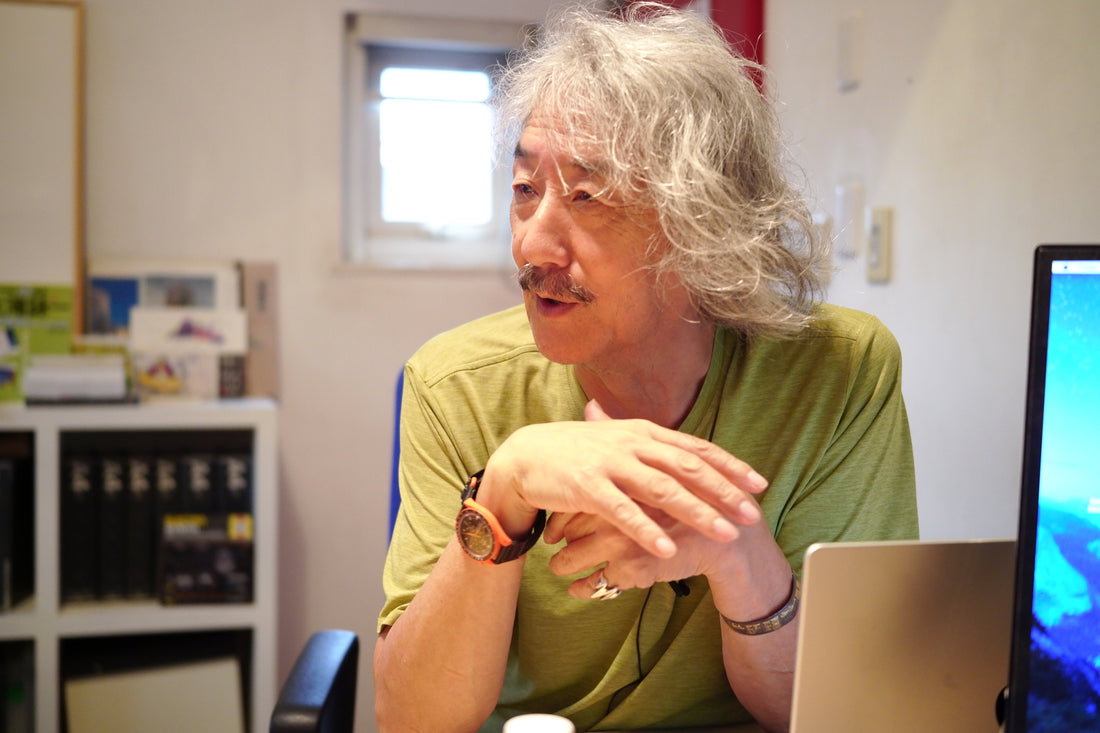The world has fallen in love with Japanese City Pop — the glossy, sophisticated sound of 1980s Tokyo.
But behind many of those timeless hits stands a quiet genius: Akira Inoue (井上 鑑) — a composer, arranger, and keyboardist whose musical fingerprints helped define the era.
Today, decades after shaping the sound of City Pop, Inoue is once again pushing boundaries — this time with PHONON, the Japanese audio brand known for its audiophile-grade headphones.
Together, they are launching an entirely new way to experience live music: the “Headphone Oasis” project.

The Unsung Architect of City Pop
Born in Tokyo in 1953, Akira Inoue studied composition under Akira Miyoshi at Toho Gakuen School of Music.
As the son of renowned cellist Yoritoyo Inoue, music was part of his DNA — but it was his early work in studios and commercials that honed his cutting-edge production sensibility.
By the late 1970s and early 1980s, Inoue was at the epicenter of the City Pop movement, crafting arrangements that blended jazz harmonies, analog synths, and the romantic melancholy of Tokyo’s urban nightscape.
He contributed to numerous hits, including Akira Terao’s “Ruby no Yubiwa”, one of the best-selling singles of the 1980s and an anthem of the City Pop sound.
As a solo artist, he released albums like “Gravitations” (1981) and “The Prophet’s Dream” (1982) — records now rediscovered by vinyl collectors and DJs around the world.
His early works are now being sampled by new-generation producers in the U.S. and Europe — proving that his music wasn’t just of its time, but ahead of it.

From City Pop to Sonic Innovation
Fast forward to today: Akira Inoue continues to innovate beyond genres.
His latest collaboration with PHONON, the Japanese headphone maker beloved by sound engineers and DJs, aims to redefine the live concert experience.
What Is “Headphone Oasis”?
Imagine a concert where every audience member wears high-fidelity headphones — hearing exactly what the musicians hear on stage.
No distortion from PA systems, no “bad seats.”
Every listener experiences the same immersive, perfectly balanced mix, as if sitting inside the studio itself.
This concept, born from Inoue’s lifelong pursuit of “true sound,” will debut as Headphone Oasis Vol. 0, featuring koto player Ms. Ami Yamamoto and supported by PHONON’s founder Isao Kumano.
“Music isn’t just for professionals or karaoke singers,” says Inoue.
“There are countless ways to live with music. I want to help people find their own.”
Rediscovering a Lost 1974 Recording
During preparation for the project, Inoue uncovered a 1974 analog 8-track tape — a fully improvised trio session featuring
Saxophone: John Zorn and Drums: Hideo Yamaki.
Digitized and restored by a studio in Kansai, the recording stunned Inoue with its clarity and vitality.
A track from this session will be exclusively available on a limited-edition card-style music package sold at Headphone Oasis events.
A Legend Who Keeps Moving Forward
While many know City Pop for its nostalgic charm, Akira Inoue embodies its deeper spirit — a fusion of innovation, craftsmanship, and emotional sophistication.
From shaping Japan’s golden pop era to pioneering new sound experiences with PHONON, he proves that true artistry never ages — it evolves.
Experience the future of Japanese sound culture.
Check out the full conversation with Akira Inoue, Isao Kumano (PHONON), and Motoaki Sayama (380 Sound) on YouTube!

Keyboardist / Arranger / Producer
Born in Tokyo on September 8, 1953. Composer, arranger, lyricist, pianist, and keyboardist.
The eldest son of cellist Yoritoyo Inoue, Akira Inoue studied composition under Akira Miyoshi at Toho Gakuen School of Music.
Around the time of his enrollment at Toho, his encounter with the late Akio Omori led him to begin composing for commercials and engaging in studio work. Since then, he has been involved in the creation of an enormous number of hit and acclaimed songs, including Akira Terao’s “Ruby no Yubiwa”, as well as collaborations with Eiichi Ohtaki, Masaharu Fukuyama, and many others.
In 1981, he made his solo debut from Toshiba EMI with the single “Gravitations” and the album “Yogensha no Yume (The Prophet’s Dream)”.
Since then, he has released a total of 17 solo albums, distinguished by their avant-garde sound and lyrical depth. His early works have been repeatedly reissued and are now enjoying renewed popularity, gaining strong support from a new generation of DJs.
His creative work transcends genre boundaries.
Inoue has engaged deeply with Japanese traditional instruments such as the koto and Tsugaru shamisen, as well as string instruments including the cello, producing compositions that combine unique rhythmic structures, modern compositional techniques, and elegant melodies and harmonies.
In 2011, he published the book “Boku no Oto, Boku no Niwa (My Sound, My Garden)”, and since 2013, he has led the project “Renga: Tori no Uta (Linked Verse – Song of the Birds)”, which received support from the Pau Casals Foundation and was performed in Catalonia and Ukraine in 2016. Around the same period, he also began holding annual solo recitals as part of an ongoing series.
A great admirer of Béla Bartók and Peter Gabriel, Inoue has collaborated since the 1980s with British artists such as David Rhodes and Tchad Blake.
In parallel, he continues to create and perform music that transcends commercial boundaries with close collaborators including Tsuyoshi Kon and Hideo Yamaki.


